Bishop Borys Gudziak: We are called to grow
Thursday, 24 October 2013, 15:01 An interview for Perspectives Ukrainiennes by Olha Herasymenko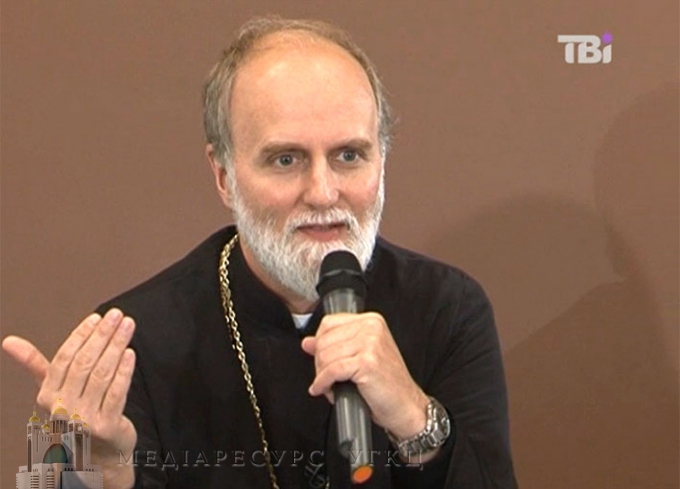
-
See also:
- Secretary of State Antony Blinken met with the Ukrainian Community of Washington
- Pray for Peace in Ukraine. An Appeal of the Ukrainian Catholic Bishops of the United States
- UCU launches flash mob to celebrate 60th anniversary of Bishop Borys Gudziak
How did the idea of acquiring the chapel emerge?
Let me state at the outset that I was not the one who came up with this idea; I “inherited” the idea of this project together with my assignment to serve in France. During my first visit to Paris before the installment, the pastor of the cathedral, rev. Mykhaylo Romaniuk, told me about this project.
He was the spokesperson for an initiating group of laity, particularly enthusiastic among who were Anna Canter and Victoria Dellinger. They were involved in community and church projects taking place in Senlis during the last few years and they were enchanted by the idea of acquiring a church in the town where the Queen of France, Anna Yaroslavna once resided.
Through contacts between the sister-cities of Senlis and the Pechersk region of Kyiv, we developed the awareness of the weighty significance of the heritage of Anna Yaroslavna. Through the intercession of President Yushchenko there was built a second memorial to the queen in Senlis and in the last few years one of the schools in the town took the name of Anna Kyivan.
So, gradually, an interest in Anna Yaroslavna and in Senlis grew among the Ukrainian community. It is upon this background that there arose the idea of acquiring the church in which one could hold regular liturgies and which could present the heritage of the daughter of Yaroslav the Wise as well as Ukrainian culture in general.
However, it could have well remained on the level of a project for years to come, if not for the entrepreneurs from Lviv who on December 2, 2012, attended my enthronement at Notre Dame Cathedral in Paris. Being in Paris, the Lviv friends visited Senlis and decided to undertake a significant step and a royal gift – assist in acquiring the closed church in royal Senlis. It was the meeting of the local enthusiasts with the group of pilgrims-entrepreneurs from Lviv, as well as the pilgrims from Kyiv and other places of Ukraine, Western Europe, Canada and USA during the December celebrations that led to the fact that we were successful in answering all financial and legal challenges in order to acquire this church, which became a reality on September 27, 2013.
On November 16, 2013, we will pray together for the first time in this church and we will hold a work-seminar -- a church/community hearing on the goals of the Church and the Anna Yaroslavna Cultural Center.
In every case, for me, it is not only the result which is important but especially its process. Until now, this process has been inspiring, positive and result-producing. I hope that the church in Senlis will mobilize and unite the faithful in France and beyond it.
You named figures of € 203,000 (purchase) and € 1,500,500 (development) as needed for the realization of this project. What do you plan to create in Senlis?
In this complex, the church would be renovated and bear the name of the Prince-Martyrs Borys and Hlib, and an Anna Yaroslavna Cultural Center would be constructed and perhaps a residence for a priest as well as an administrative building to hold spiritual-cultural events of the Church as well as the Center.
The planning is in its beginning stages. We are inviting a large international group of advisers to participate in the project. We want to create a general consensus so that as many people as possible can understand how this project will be distinguished and join in the effort. I am looking forward with great anticipation to the meetings, which will begin quite soon, and I expect many interesting perspectives and ideas. In general, it is self-understood that this should be a place of liturgies during which there will be a familiarization with the thousand year old Ukrainian Christian tradition as well as a place to learn about the heritage of Anna Yaroslavna and, in general, about Ukrainians in France.
Visits to this religious place and the center should not only be limited to retrospection. It is anticipated that Senlis, together with Paris and Lourdes, will become a meaningful place for visitors/pilgrims from Ukraine. In this Church and this Center there should be a deeply thought out spiritual and creative re-thinking of various issues which are interwoven with our Europeanism, French-Ukrainian relations, our art, music, history, and culture. Paris and its royal Senlis offer a beautiful square for creating visions and prototypes of our future.
One of the basic dimensions of this modality will find expression already on the first day, that is, on November 16th of this year. The guests of the center and the church should be their co-creators, actively voicing proposals for its program and style. This Saturday we will hold a public working discussion of the content and architectural plans. Undoubtedly, the Anna Yaroslavna Center will be the promoter of the identity of a Ukrainian woman and Ukrainian womankind as a leading element in the history of the present. On the other hand, the creative comprehension of challenges that face Ukrainian men could be dealt with through the creation of a Brotherood of Borys and Hlib in Paris. The heritage of Borys and Hlib for our harrowed society and overdone politico is significant.
From where do you plan to access the necessary finances?
At present, St.Volodymyr the Great Eparchy does not possess money for renovations and equipment. In defining the activities program we are deliberating the system of finances and already there appear willing supporters, for example, a young pair from USA wrote that on the occasion of their wedding they want to make a contribution to the new church. News about the acquisition of the Church of Borys and Hlib spread like lightning throughout all of Ukraine as well as throughout all continents. We hope that this virtual interest will also result in concrete acts of personal involvement in the development of an innovative center and a global environment that will be created around it. I expect a wide circle of philanthropists of this project and the eparchy in general.
Are investments now a priority of the Greek-Catholic Church?
Investments are always a priority for the Church. The question remains – what kind of investments? You are asking about material investments. The automatic contrapositions of the material and the spiritual are a misunderstanding. Christianity is also “a material” religion. The Son of God was reincarnated. If for God, material were not important, He would not bless us with his presence.
UGCC, often in Ukraine and beyond it, lacks infrastructures to fulfill its vocation goals and needs certain instruments, including appropriate buildings,-- buildings, of course, filled with spiritual content.
For me it is very important that ideas, values and human involvement do not lag behind the material steps. Therefore, in the Senlis project, the process of meetings and the maturing of Christian and community awareness are of primary importance. This is exactly to what we want to devote our efforts in the immediate future and invite all readers to participate, beginning with the meeting on November 16th.
You are proposing to buy churches for Greek-Catholic services. But in Western Europe more and more churches remain empty because of the lack of priests. So, is it worth it to tie the Church to the material, when it is possible to freely use obvious empty space that is not in the possession of the Ukrainian church?
I propose many things. I propose to have faith that God works among our people not any less than among other. I propose that we believe in this. The proposal for churches and premises comes from the basic proposal which correlates to our spiritual growth and community development. I believe that God calls us to a dynamic, fruitful life. We are called to grow. My proposals by no means exclude your intuition. But let us agree, that in many situations we remain on the level of bird rights.
Today in Paris we have 115 children in Ukrainian School, and we only possess one auditorium. The lessons, meetings happen in my modest office, in the office of the pastor which itself is divided into two classrooms. And in such circumstances it is difficult to carry out lessons and to focus the attention of the children. Other classes are spread throughout the facilities of the Roman Catholic churches. Don’t our children deserve better? I propose that some material resources which Ukrainian businesses have attained, be directed for the material, moral and spiritual needs of our children, youth, elderly, migrant workers, the deprived. I think the time has come that we be the landlords in Ukraine and also beyond it. And I feel that many people totally support such an appeal and position. And the others will join when they see the spiritual fruits and the realistic results.
In all of this, one needs to be courageous, enterprising and understanding.
Do you think that the material investment in such countries as Switzerland and Holland will correlate to the number of parishioners who reside there? Is the number of Greek-Catholic parishioners greater in Spain and in Italy?
Spain and Italy are beyond my jurisdiction, therefore it is hard for me to judge what is worth doing there. To have one’s own place in Switzerland and in the Netherlands would be useful. In both places our communities are reaching the fourth generation. And the lack of an infrastructure and the weakness of our community and church life in these places are interrelated.
Do you have plans about other buildings which belong to the Greek-Catholic episcopate, such as the Shevchenko Scientific Society in Sarcelles which is degrading year by year.
During this year in the eparchy there is a total audit being conducted which should clarify the pastoral, administrative, financial and material condition, including the state of real estate. Related to this, I have gone to Sarcelles several times – alone and also with representatives of the Ukrainian academic community so that we could together realize the sorry state of affairs.
With such institutes as Sarcelles, it is important to bear in mind that the memory of a great, heroic past, cannot always serve as a guide for the future. Is Sarcelles the best place for the future Ukrainian scholarly development in Paris? We should contemplate this all together. For more than a quarter of a century, people and material resources for fruitful scholarly work in Sarcelles do not exist. Maybe there are concrete reasons for that?
Recently while in USA, I consulted with Academician Leonid Rudnytsky, the head of the World Council of the Shevchenko Scientific Society. Similar consultations are being held between me and other Ukrainian organizations—both about Senlis, as well as Sarcelles and all the questions facing us in order to gain the best comprehension of the needs and possibilities as well as the consensus of the wider community.
As is often the case, the basic issue regards awareness and desire. Are we prepared to constructively, with sacrifice and dynamics, work in order to be fruitful? I have a strong conviction that in the spiritual, community academic and cultural dimensions, we have in France, Switzerland, the Benelux countries, wonderful opportunities. It is in this manner that I propose that we approach various complex questions and tasks.
What other priorities do you see for the Ukrainian community in France?
The Ukrainian community in France needs consolidation – moral, structural and institutional. It is marked by past party differences. Today it suffers from political and social misfortunes, which exist in Ukraine and the feeling of which the emigrants who arrive here in search of jobs, bring with themselves. It lacks the infrastructure for guaranteeing the needs of the new wave of emigrants.
I believe that, above all, one must primarily create a positive atmosphere in which constructive thinking, collaboration and work will oust the conflicts, prejudices, complaints and destructive criticism. We are all called to be happy, fully-valued individuals who do not doubt our dignity and cultivate our God-given spiritual, national and cultural identity while being open to dialogue and collaboration with the wider world which surrounds us. I am convinced that the openness of our institutional doors to all people of good will is today extremely important.
What challenges do you face? What resources do you have to respond to them?
My first challenge was to become familiar with the situation and not to hurry with unconsidered steps, in other words, to carefully listen and hear the people. I think that I have listened and heard a lot. The time of the previous familiarity has gone by and now it is beginning to be understandable that more collaborators are needed. We have 16 priests for 5 countries, whereas we need 30-40, maybe even 50. I am actively searching for candidates for cooperation and hope that in the near future our community will see these sacrificing, young and dynamic priests.
It is important to engage people who for this or that reason have not yet become involved in our spiritual or community organizations. For example, in France according to official data there are more than 2,000 students from Ukraine. Until now, neither the Church nor the community have succeeded in formulating for them convincing proposals.
Very important is the work with youth. Therefore, I am very happy about the work of the Ukrainian School and catechization classes. Our teachers, especially the priests and nuns are working heroically. Children and youth are our future.
During these days I am hosting in my home an international philosophy symposium with the participation of leading tinkers, sociologists, theologians from eight different countries and hope that our community life will be also marked by academic and creatively critical thinking. Our Cathedral in Paris shines with positivity in which we pray together with inspiring singing, and I hope that we will build on this.
For all of these attempts -- increasing staff and developing the infrastructure -- the means need to be found. And I also have been working on this issue in the last few months.
A few months ago you visited a previous summer camp in Mаcwiller en Alsace. The Ukrainian community in neighboring Moselle expected to meet you. Do you expect to meet them?
I gladly address myself to all your readers, assuring them that I and the clergy will do everything possible to stretch out our hand to every Ukrainian soul, and not only Ukrainian. The residents of Moselle know the state of the Ukrainian residents in Macwiller – in regard to the extremely fruitful work of Father Pavlo Kohut. In l982 as a seminarian in Rome, I worked for Father Pavlo and retain a sacred memory of this energetic pastor. Here they learned God’s Commandments and Ukrainian songs and our culture and here future couples from all over France met – and not only from France; here the young and the old all gathered. I went to Macwiller several times. Right now the premises are locked up and unavailable for any activities because they do not meet the state requirements and to renovate team requires hundreds of thousands of Euros.
I am very pained by the fact that this settlement is being deserted and going downhill, that already for the third decade the scholarly center in Sarcelles is degenerating, that the Ukrainian hotel in Lourdes is already closed for five years because it does not meet the state standards. Every year a substantive part of money is appropriated in order to cover the insurance and taxes but the community cannot use these premises. Therefore, I hurried to those places in order to familiarize myself with the situation and the people so that they could share their institutional history.
The territory is large, five counties. This is more than the entire size of Ukraine. I hope that the Moselle residents and those from many other places will forgive the bishop who during the first few months of his presence could not visit each community on such a spread out and complicated pastoral territory.
I inherited a yearly budget of 35,00 € for all activities of the bishop in five countries. With such a budget, it is understandable why there was no secretary for the bishop, no chancellor or a housekeeper. Until recently there was only one priest in Paris – the cathedral pastor. Since my forerunner, the late Bishop Mykhail Hrynshchyn passed away before I took office, and since he also did not have a secretary or a chancellor, I for almost a year have been occupied with work akin to Sherlock Holmes, attempting to understand how our pastoral, canonical, financial and material situation looks.
Therefore, with the blessing of Patriarch Sviatoslav Shevchuk and the Permanent Synod, in our eparchy, the first in the history of our Church the abovementioned totally transparent outside audit is taking place. I hope that the appearance of a young clergy, the ordering of legal, fiscal and property issues will permit the eparchy and the eparch to systematically tune up the appropriate pastoral services. Such global reforms can hardly be done in a matter of months, all the more since until September, I also fulfilled the obligations of rector of Ukrainian Catholic University in Lviv, headed the Staff Commission of the Kyiv-Halychyna Metropolitanate and am a member of the Permanent Synod of the Ukrainian Greek-Catholic Church.
I apologize to the Moselle residents as well as to other faithful whose expectations I have not fulfilled. May God grant us that we meet in the future. In the meantime, I invite all of you on November 16th to our services in Senis and on November 17th in Notre Dame in Paris. We will work earnestly but it will take longer than a year to get out of this situation. We need everyone’s help.
You talked about the fact that among Ukrainians abroad there are various waves and movements. In your opinion what can unite them into one group? Is it the role of the Church to appeal to them for unity: a Church which itself over centuries has been divided and has fought against itself?
Again and again I encourage myself and the faithful to focus on the positive. In the Church and community there are many defects, but no other institution has demonstrated such an ability and continuance “gathering those lost among the living” as the Church. It has done it for over a thousand years.
Maybe imperfectly, yet still our Church in Western Europe is the most outgoing to our migrant workers and those in need (I remind you of the budget with which we started). I believe that business (large, medium, small) as well as government authorities could benefit from this example and group more towards consolidating the Ukrainians abroad. Now, we have a wonderful opportunity to do this.
What do you think of pseudo-history – is it worthwhile to develop legends since people like symbols and reminders of old history, or is it better to dethrone these (for example like the fairytale about Orly, a city that was supposedly named Orlyk).
In general, I am a historian by specialty and would gladly devote a whole interview to this. For now, it is worthwhile to constitute that objectively flawed fantasies are not worth perpetuating. Here I am an adherent of deconstructing flawed myths. However, the ability to see, to experience certain signs and symbols characterizes civilization and culture. Therefore, I think that the meaning of signs and symbols of history and of our times can bring great fruits. The total deconstruction of all symbols and traditions has led to a deep impoverishment of the present time. In popular understanding, a myth is an untruth. However, in its full definition, a myth is the deep meaning of a certain story, narrative or picture. I adhere to the idea of searching the depths.
In French : http://www.perspectives-ukrainiennes.org/

We can imagine what the prayer of the prisoners in the Russian torture centers in the Ukrainian Kharkiv region was like – Head of the UGCC on the 206th day of the war 17 September
A vast cemetery, a mass burial, was found near the city of Izyum, in which more than 400 innocently killed and tortured people have already been...
-
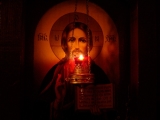 Глава УГКЦ у 158-й день війни: «Нехай Господь прийме з уст нашої Церкви псалми та моління за всіх тих, які особливо просять нашої молитви»
Глава УГКЦ у 158-й день війни: «Нехай Господь прийме з уст нашої Церкви псалми та моління за всіх тих, які особливо просять нашої молитви»
-
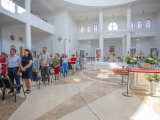 «Сила, яка походить із вірності Христові, є стержнем, який ніхто не може зламати», – Блаженніший Святослав
«Сила, яка походить із вірності Христові, є стержнем, який ніхто не може зламати», – Блаженніший Святослав
-
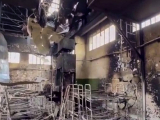 Глава УГКЦ у 157-й день війни: «В ім’я Боже ми засуджуємо звірства в Оленівці і світ повинен це засудити як особливий вияв дикості й жорстокості»
Глава УГКЦ у 157-й день війни: «В ім’я Боже ми засуджуємо звірства в Оленівці і світ повинен це засудити як особливий вияв дикості й жорстокості»
-
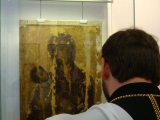 «Боже, почуй наш плач і поспіши нам на допомогу і порятунок!», – Глава УГКЦ у 156-й день війни
«Боже, почуй наш плач і поспіши нам на допомогу і порятунок!», – Глава УГКЦ у 156-й день війни
-
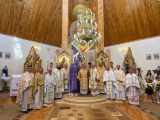 «Бог йому дав серце і душу українського народу»: відбулася щорічна проща до Прилбичів з нагоди уродин митрополита Андрея Шептицького
«Бог йому дав серце і душу українського народу»: відбулася щорічна проща до Прилбичів з нагоди уродин митрополита Андрея Шептицького
-
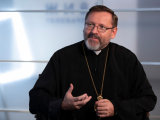 Глава УГКЦ: «Я горджуся українськими патріотами, які без найменшої краплі ненависті готові захищати своє»
Глава УГКЦ: «Я горджуся українськими патріотами, які без найменшої краплі ненависті готові захищати своє»
-
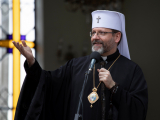 Блаженніший Святослав закликав українську молодь скласти присягу на вірність Христові
Блаженніший Святослав закликав українську молодь скласти присягу на вірність Христові
-
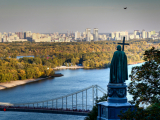 Глава УГКЦ у 155-й день війни: «Помолімося, щоб не втратити скарбу віри князя Володимира»
Глава УГКЦ у 155-й день війни: «Помолімося, щоб не втратити скарбу віри князя Володимира»
-
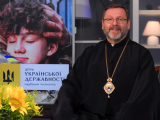 Блаженніший Святослав у День державності України: «Наша Держава – це для нас питання життя або смерті»
Блаженніший Святослав у День державності України: «Наша Держава – це для нас питання життя або смерті»
-
 Глава УГКЦ у 154-й день війни: «Нехай Господь Бог прийме у свої вічні обійми журналістів, які віддали за правду своє життя в Україні»
Глава УГКЦ у 154-й день війни: «Нехай Господь Бог прийме у свої вічні обійми журналістів, які віддали за правду своє життя в Україні»
-
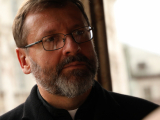 Глава УГКЦ у 153-й день війни: «Принесімо наш біль перед Боже обличчя і будьмо певні, що Він нас вислухає»
Глава УГКЦ у 153-й день війни: «Принесімо наш біль перед Боже обличчя і будьмо певні, що Він нас вислухає»
-
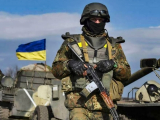 Глава УГКЦ у 152-й день війни: «Помолімся молитву заступництва за наших воїнів»
Глава УГКЦ у 152-й день війни: «Помолімся молитву заступництва за наших воїнів»
-
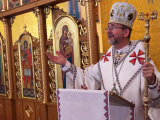 «Віруюча людина не може бути байдужою, коли бачить страждання іншої людини», – владика Богдан Дзюрах
«Віруюча людина не може бути байдужою, коли бачить страждання іншої людини», – владика Богдан Дзюрах
-
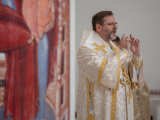 «Серед нашого страждання творімо простір для прояву Божої всемогутності», – Глава УГКЦ у 6-ту неділю після П’ятдесятниці
«Серед нашого страждання творімо простір для прояву Божої всемогутності», – Глава УГКЦ у 6-ту неділю після П’ятдесятниці
-
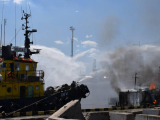 Глава УГКЦ у 151-й день війни: «Російське віроломство ми перемагаємо силою любові до нашої Батьківщини»
Глава УГКЦ у 151-й день війни: «Російське віроломство ми перемагаємо силою любові до нашої Батьківщини»

